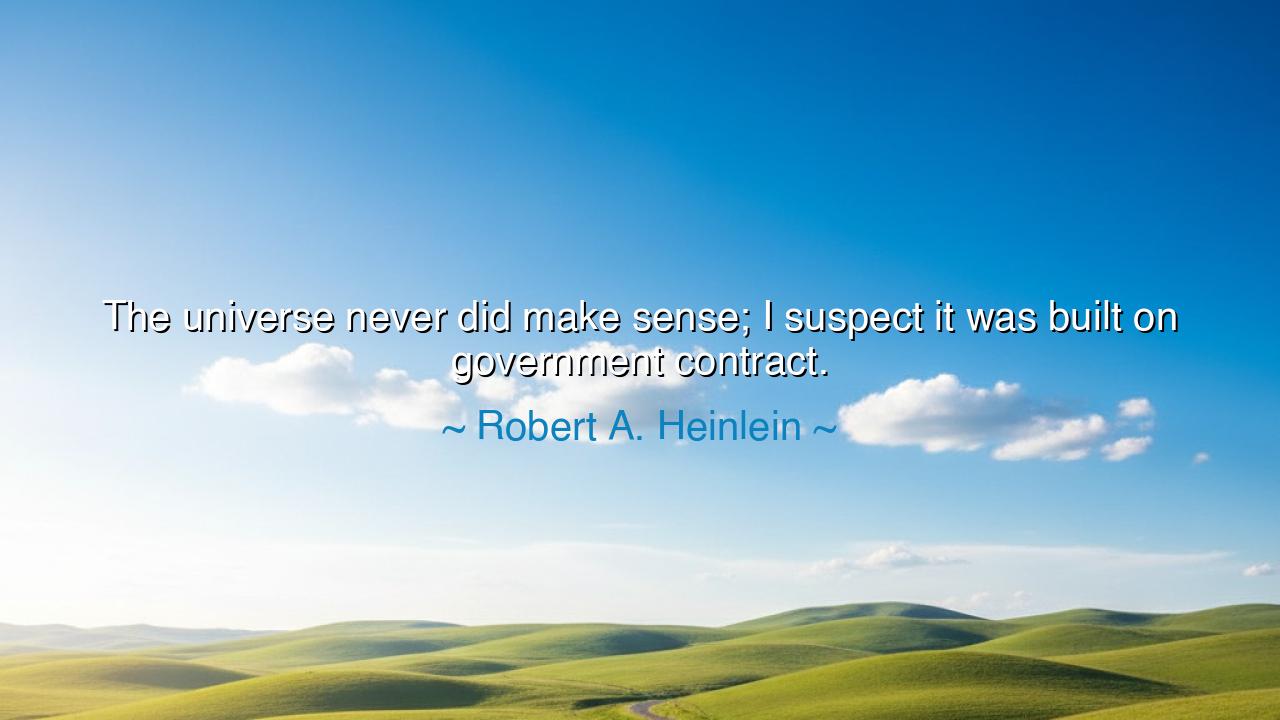
The universe never did make sense; I suspect it was built on






"The universe never did make sense; I suspect it was built on government contract." – Robert A. Heinlein
In this sardonic yet profoundly revealing statement, Robert A. Heinlein, the great American writer and philosopher of science fiction, lays bare both his wit and his wisdom. Beneath the humor lies a truth about the nature of existence and of human institutions: that the world is chaotic, imperfect, and often constructed with the same flaws, inefficiencies, and contradictions that plague the workings of government. When he says, “the universe never did make sense,” Heinlein is not lamenting creation; he is acknowledging the mystery and disorder that underpin life itself. And when he adds, “I suspect it was built on government contract,” he draws upon the recognizable failings of bureaucracy—waste, confusion, and compromise—to illustrate the imperfection of existence. It is a jest, but one born from a philosopher’s heart: a recognition that imperfection is the law of both man and cosmos.
The origin of this quote can be found in Heinlein’s broader body of work, which often weaves together sharp political satire, moral philosophy, and scientific imagination. Having served in the U.S. Navy and later lived through the tumult of two world wars, the Cold War, and the birth of the space age, Heinlein knew both the triumphs and follies of government systems. His humor was not bitterness—it was insight. In comparing the universe to a government contract, he is not insulting creation; rather, he is mocking humanity’s tendency to seek logic in a world built from contradictions. The stars and atoms, the laws of nature and the heart’s desires—each follows a rhythm beyond human understanding, much as the workings of bureaucracy often defy reason itself.
But Heinlein’s jest hides a deeper philosophy. He is reminding us that chaos and inefficiency are not failures—they are conditions of existence. Just as a government project may be filled with confusion, miscommunication, and yet somehow still result in bridges, satellites, and progress, so too does the universe operate with apparent disorder while producing beauty, life, and meaning. The human mind yearns for order, but life resists it. Nature is not a machine; it is a vast, self-adjusting system that thrives in imbalance. The “government contract” of creation is not a document of precision, but of glorious imperfection.
History provides endless examples of this paradox. Consider the Apollo Program, born of government ambition, riddled with bureaucracy, politics, and inefficiency. Yet from that labyrinth of red tape and error emerged one of humanity’s greatest achievements: men walking upon the moon. It was not perfect planning that carried them there, but human persistence in the face of disorder. Heinlein himself, who believed deeply in human ingenuity, would have smiled at the irony—that even a system as clumsy as government could reach for the stars. His words remind us that miracles are often born out of messes, and that perfection is not a prerequisite for greatness.
There is also a spiritual undercurrent in Heinlein’s humor. To say the universe “never did make sense” is to confess that wisdom begins with humility. The ancients knew this well. The Stoics taught that the world is governed by divine reason—logos—yet that reason is not always visible to mortal minds. The Book of Job, in its ancient poetry, confronts the same mystery: that the human desire to comprehend creation will always be humbled by its vastness. Heinlein, in his modern tongue, speaks the same eternal truth with laughter instead of lament. The universe, he suggests, is not a puzzle to be solved, but a story to be lived.
And yet, his quip carries a quiet challenge. If the universe and the governments of men are both imperfect, then our task is not to curse them, but to build within their flaws. Just as engineers correct what blueprints forgot, just as citizens reform what governments misuse, so must every human being learn to make meaning amid confusion. To dwell on the absurdity of existence is futile; to create order, beauty, and compassion within it—that is divine. Heinlein’s humor thus becomes a kind of wisdom: accept imperfection, and work through it anyway.
The lesson, then, is this: do not demand that life make sense. It was not built to obey your logic. Whether in the cosmos or in government, imperfection is inevitable—but it is also the seed of creativity and resilience. The wise man learns to laugh at the universe’s contradictions while still striving to make it better.
And so, the practical actions are these: approach life with both irony and reverence. When you face disorder, do not despair—find your role within it. When you encounter inefficiency, do not rage—build something worthy in spite of it. Remember that the universe, like all great endeavors, is a work in progress, full of errors that somehow give rise to wonder. For as Robert A. Heinlein reminds us, even if creation bears the clumsy stamp of a “government contract,” it remains magnificent, and within its madness lies the adventure of being alive.






AAdministratorAdministrator
Welcome, honored guests. Please leave a comment, we will respond soon